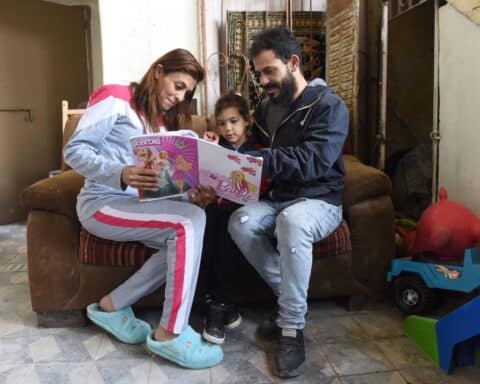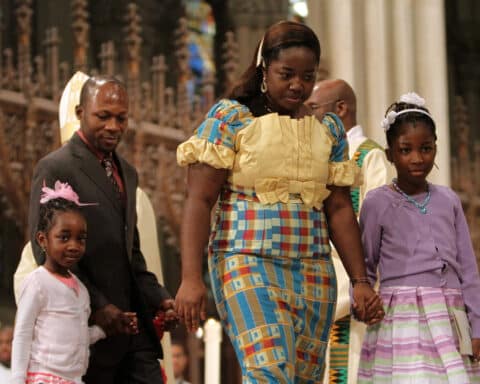I cry every Christmas. I wish I could tell you those tears come from being overcome by the miracle that is Christ’s birth, but that would be a lie. I cry because the stress of the holidays has built up inside me with such fervor that it has no place to go except exploding out of my eyeballs. I cry because the middle kid doesn’t have enough presents or because I yelled and I wish I was a kinder mother. Even Suzy Homemaker’s elf post makes me cry. Her elf is propelling itself down a candy cane zip line, and I can’t even remember to move the dang thing. Every tear has its birthplace in shallow, unrealistic expectations I’ll never meet.
You know who meets my expectations? The Catholic families that live on Instagram and in my imagination. Christmas elicits feelings of joy and grace for those people. They move Mary and Joseph around their home in place of the *tisk tisk* secular elf. I envision their children sitting quietly around the dinner table as Dad lights the candles on the Advent wreath and Mom reads from the devotional. Those families remember the “reason for the season.”
I’m sorry to say, that’s never been my experience. It is impossible to remember any reasons for any seasons with the noise level inside my home. My children begin fighting roughly three seconds into any attempted holy activity. The 4-year-old hurries to blow out the rainbow makeshift Advent candle before her brother does and burns her hair off in the process. The 6-year-old begins to cry because it’s “not fair” that she didn’t blow out the candle this time, and the baby on my husband’s hip joins her because, why not? Eventually, 50% of us are crying, and it’s all too much. We give up and turn on CoComelon like the crummy Catholics we are. It doesn’t ever look beautiful for us. It just looks like we’re feral and allergic to order.
Last year, I managed to get through all of Christmas morning without a tear. The kids woke up and opened presents from Santa. I sat on the couch, jaw clenched, repeating, “You’ve done enough, Diana; you’ve done enough” over and over to myself. There was even a moment when I looked around our living room and felt — you’re not going to believe this — joy. My oldest daughter was searching for spare batteries, and there wasn’t a single space free of crumpled up wrapping paper, tape or empty boxes, and yet I was completely overcome with grace. I could literally feel God’s presence and love in that ordinary moment, and out of nowhere, I was able to see my life for the beautiful, chaotic gift it was.
That holy moment lasted only a few seconds before it was back to business as usual. Later that day, we spent Christmas with my husband’s family. Christmas was almost officially done and I’d managed to make it through without a single tear. On the drive home, my husband reached for my hand and gave it a squeeze. “You did good this year, mama,” Marvin said. “I’m proud of you.” I was proud of me, too.
A few hours later, I startled awake. “Mom? Mom? What’s wrong,” my husband yelled into his phone. My mother in law was wailing so loudly on the other end that I could hear her. “Dad died,” my husband said as he hung up the phone. I didn’t understand. How could he be dead? He couldn’t be dead. It was impossible. He was fine. He had just cooked Christmas dinner a few hours earlier. The events that followed that phone call on Christmas night have burned themselves into my memory, and I can recall them like a traumatic movie.
Turns out, I didn’t make it through Christmas without crying after all. In fact, I cried more tears in the months that followed than I probably ever have. We lost the patriarch of the family. Marvin’s dad was always there, dependable, central. He was the phone call when my car had a flat tire or I didn’t feel like cooking. I called him so often that his number is one of the handful I have committed to memory. It was a devastating loss for the family, one that I could never adequately sum up with words.
We were finally getting to the place where we could string a few days together without crying when Thanksgiving rolled around. Now something as simple as planning the Thanksgiving menu leaves everyone in tears. He’s missing. He’s not here. Everything is a reminder.
There are not many good things that come from loss, but I’ve grown to see the perspective it brings as a gift. I don’t know why God designed the whole thing like this, hiding the most important life lessons in suffering and struggle. No offense God, but it sucks. I can remember exactly how it felt to be the woman who cries because the tree isn’t as beautiful as she hoped it would be. That poor, anxious girl. She didn’t know. She didn’t know that perfectly decorated trees and zip-lining elves and Advent traditions aren’t what make life beautiful. All of that stuff is just extra. Feel free to indulge in the extra if it brings you joy, but take my advice: If it doesn’t, skip it. Christmas is for loving people. That’s it. Crying on Christmas has become my coveted tradition. I welcome the tears that come from grieving my father-in-law.
I imagine this year we’ll all be huddled into my living room with red, puffy eyes. Nothing about our Christmas will be magazine worthy, but those tears won’t be born in the same shallow stress place as my traditional Christmas tears. They’ll be the tears of a family who just doesn’t understand how he could really be gone. Those tears are a privilege, a badge of honor for having lost someone great.
The best gift you could give the people in your life is to love them like you might not get the chance tomorrow. That’s the lesson my family learned last Christmas.
Diana Vallette writes from Louisiana.





